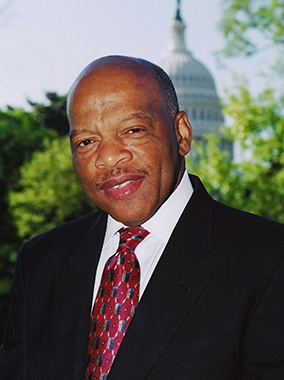Protector of the Dream
February 14, 2018 by Las Vegas Black Image Magazine
Filed under Cover Story, Feature, Photos
Protector of the Dream
Congressman John Lewis is living history, and his role as America’s conscience has never been more important.
The civil rights movement, which peaked between the late 1950s and early 1970s, was a proving ground for some of America’s most enduring leaders. While many have gone on to their eternal reward, Congressman John Robert Lewis still walks among us. He remains on Capitol Hill — fighting for Georgia’s 5th District, speaking out against injustice, and holding America’s moral compass.
Lewis marched with and worked alongside Martin Luther King Jr. — and still wears the scars of a brutal crackdown on the peaceful demonstrators who fought tirelessly to build a future free of racial inequality. He has dedicated his life to protecting human rights and defending civil liberties, and won worldwide admiration for his ceaseless work to build what the congressman calls a “beloved community” for all people.
He was born in 1940, just outside of Troy, Alabama — the son of a sharecropper who grew up on his family’s farm. His path was forever changed when he heard Dr. King on the radio, and committed himself to the civil rights movement.
“We have come a long way in America because of Martin Luther King Jr.,” said Lewis. “He led a disciplined, nonviolent revolution under the rule of law — a revolution of values, and a revolution of ideas. We’ve come a long way, but we still have a distance to go before all of our citizens embrace the idea of a truly interracial democracy, what I like to call the Beloved Community, a nation at peace with itself.”
Congressman Lewis began his life as a civil rights activist when he was a college student at Fisk University. He organized sit-in demonstrations at segregated lunch counters in Nashville, Tennessee. In 1961, he volunteered to participate in the Freedom Rides, which challenged segregation at interstate bus terminals across the South. Congressman Lewis risked his life on those rides many times by simply sitting in seats reserved for white patrons. He was also beaten severely by angry mobs and arrested by police for challenging the injustice of Jim Crow segregation in the South.
By 1963, Lewis was one of the Big Six leaders of the civil rights movement — and an architect of, and a keynote speaker at, the March on Washington. Years later, the nation’s first black president awarded him the Medal of Freedom, America’s highest civilian honor.
Congressman John Lewis, in his own words:
“I met Rosa Parks when I was 17. I met Dr. Martin Luther King when I was 18. These two individuals inspired me to find a way to get in the way, to get in trouble. So I got in good trouble, necessary trouble.”
“I thought I was going to die a few times. On the Freedom Ride in the year 1961, when I was beaten at the Greyhound bus station in Montgomery, I thought I was going to die. On March 7th, 1865, when I was hit in the head with a nightstick by a state Trooper at the foot of the Edmund Pettus Bridge, I thought I was going to die. I thought I saw death, but nothing can make me question the philosophy of nonviolence.”
“When people tell me nothing has changed, I say come walk in my shoes and I will show you change.”
“The vote is precious. It’s almost sacred. It is the most powerful nonviolent tool or instrument that we have in a democratic society. And we must use it.”
“If you’re not hopeful and optimistic, then you just give up. You have to take that long hard look and just believe that if you’re consistent, you will succeed.” “You cannot give up—you have to be persistent and keep pushing, and press on.”







